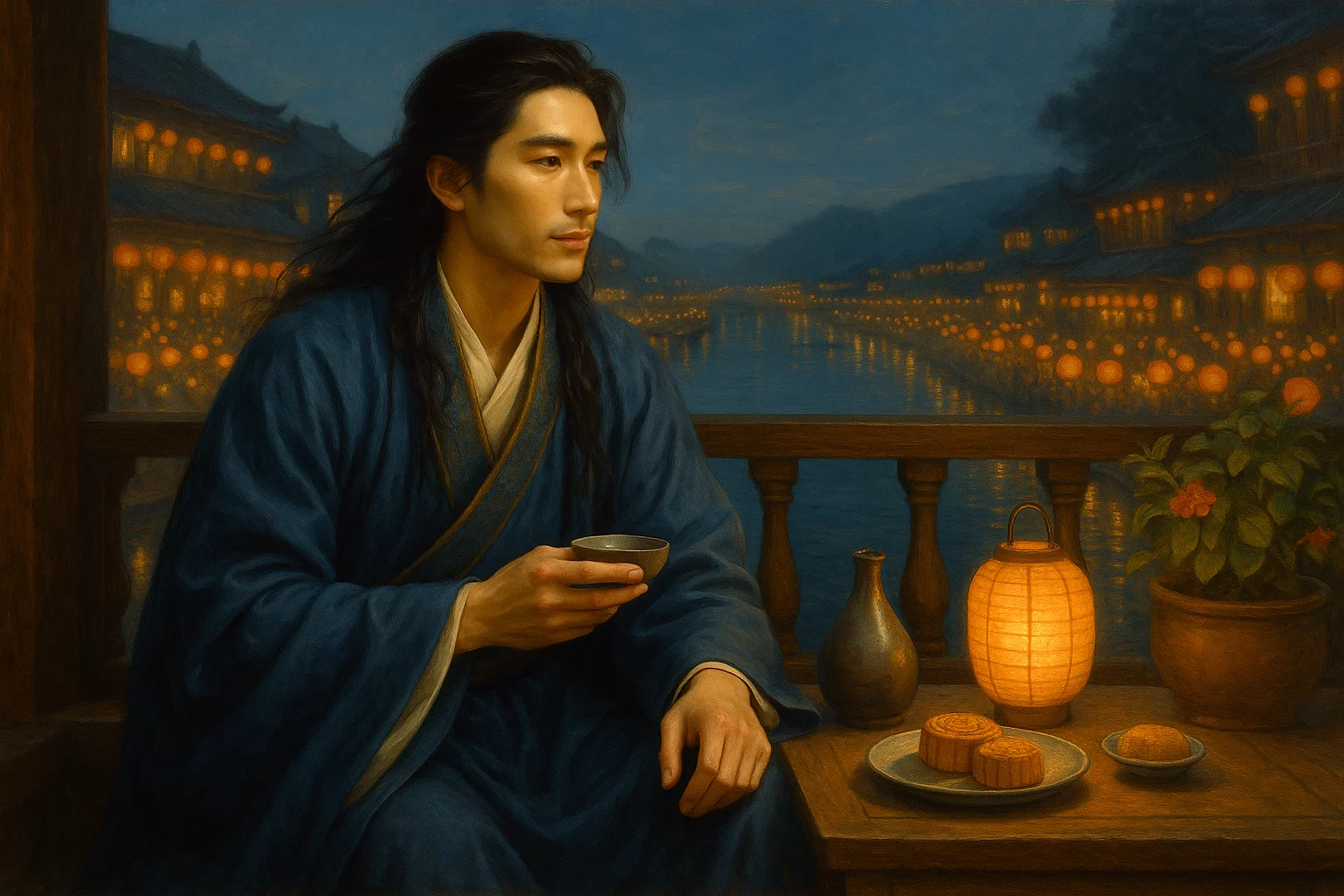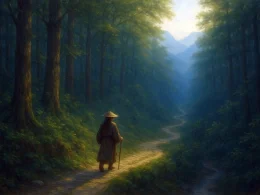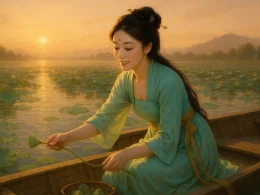Winds toughen young orioles, rains swell sour plums,
Noon weaves perfect circles under blessed domes.
Damp earth clings to hills—robes steam with incense sighs.
In hush, black kites carve joyous arcs,
Past stone arches, jade currents spark.
Leaning long on balustrade, by reeds and bitter stalks,
I chart a course for Jiujiang's sighs.
Perennial migrant—like spring swallows,
I cross dust-wastes to lodge on alien rafters.
Cease thoughts of worldly chains,
Cleave to wine's amber chains.
This gaunt Jiangnan drifter
Shudders at frenzied strings and pipes.
At banquet's rim,
Let me first spread my grass-mat—
Grant me oblivion's grip.
Original Poem
「满庭芳 · 夏日溧水无想山作」
风老莺雏,雨肥梅子,午阴嘉树清圆。
地卑山近,衣润费炉烟。
人静乌鸢自乐,小桥外、新绿溅溅。
凭阑久,黄芦苦竹,拟泛九江船。年年。如社燕,飘流瀚海,来寄修椽。
周邦彦
且莫思身外,长近尊前。
憔悴江南倦客,不堪听、急管繁弦。
歌筵畔,先安簟枕,容我醉时眠。
Interpretation
Composed in 1093 when Zhou Bangyan, aged thirty-seven, assumed magistracy of Lishui County, this ci emerges from seven years of provincial exile since leaving the capital in 1087. Nestled in Jiangnan's humid lowlands, Lishui's rain-saturated landscapes and secluded Mount Wuxiang provided the setting for this meditation on bureaucratic displacement. Through meticulous natural observation and migratory metaphors, Zhou articulates the quiet despair of political marginalization while affirming artistic resilience—making this work a masterclass in lyrical understatement and emotional complexity.
First Stanza: "风老莺雏,雨肥梅子,午阴嘉树清圆。"
Fēng lǎo yīng chú, yǔ féi méi zǐ, wǔ yīn jiā shù qīng yuán.
Winds mature oriole fledglings,
rains plump the sour plums—
noon shadows beneath fine trees
form crisp circles.
Zhou's opening distills Jiangnan's early summer through biological metamorphosis. Personified elements ("winds mature," "rains plump") frame nature as nurturing parent, while "crisp circles" geometrizes dappled shade into perfect forms—an implicit contrast to the poet's own irregular career path. The stanza establishes Zhou's signature technique: transforming sensory data into temporal markers and hidden order.
Second Stanza: "地卑山近,衣润费炉烟。人静乌鸢自乐,小桥外、新绿溅溅。"
Dì bēi shān jìn, yī rùn fèi lú yān. Rén jìng wū yuān zì lè, xiǎo qiáo wài, xīn lǜ jiàn jiàn.
Lowlands press close to mountains,
robe-damp demands brazier's smoke.
In human stillness, kites revel—
beyond small bridge,
fresh greens splash and shimmer.
Topographic claustrophobia ("lowlands press close") mirrors bureaucratic suffocation, while "robe-damp" symbolizes the persistent moisture of discontent. The counterpoint between human stasis and avian freedom underscores Zhou's entrapment, with hydrologic imagery ("splash and shimmer") introducing liquid mobility as thematic undercurrent and unrealized escape route.
Third Stanza: "凭阑久,黄芦苦竹,拟泛九江船。"
Píng lán jiǔ, huáng lú kǔ zhú, nǐ fàn Jiǔjiāng chuán.
Long leaning on railings,
yellow reeds and bitter bamboos—
I dream of Nine Rivers' boats.
Protracted contemplation ("long leaning") yields literary invocation: "yellow reeds and bitter bamboos" quotes Bai Juyi's Pipa Xing, layering another exiled official's lament over Zhou's predicament. The imagined "Nine Rivers' boats" symbolize both escape vessels and historical echoes—mental time travel through precedents of displacement.
Fourth Stanza: "年年。如社燕,飘流瀚海,来寄修椽。且莫思身外,长近尊前。"
Nián nián. Rú shè yàn, piāo liú hàn hǎi, lái jì xiū chuán. Qiě mò sī shēn wài, cháng jìn zūn qián.
Year after year,
like seasonal swallows,
drifting desert seas,
perching on strangers' rafters.
Better not ponder beyond self—
stay ever near the wine jar.
The swallow metaphor crystallizes Zhou's existential condition—a perpetual migrant dependent on others' structures ("strangers' rafters"). The volta "better not ponder" transitions from melancholy to resigned hedonism, where the wine jar becomes both anesthetic and philosophical anchor, recalling Tao Yuanming's pastoral escapism yet devoid of its agrarian fulfillment.
Fifth Stanza: "憔悴江南倦客,不堪听、急管繁弦。歌筵畔,先安簟枕,容我醉时眠。"
Qiáo cuì Jiāngnán juàn kè, bù kān tīng, jí guǎn fán xián. Gē yán pàn, xiān ān diàn zhěn, róng wǒ zuì shí mián.
Haggard, this weary Jiangnan sojourner
can no longer bear
urgent pipes and frantic strings.
By the singing mat,
first lay out bamboo bed—
let me sleep in drunkenness.
The closing reveals aesthetic and spiritual exhaustion. Rejecting artificial revelry ("urgent pipes"), Zhou seeks primal repose ("bamboo bed"). This final gesture—"let me sleep in drunkenness"—operates as both surrender and subtle resistance, preferring solitary stupor to compulsory merriment in a world of bureaucratic performance.
Holistic Appreciation
Zhou constructs a spatial and psychological diptych. The first three stanzas externalize Lishui's ecosystems with scientific precision—avian development, phytomorphology, hydrology—while the latter two stanzas internalize these observations into migratory metaphors and alcoholic retreat. The poem's structure mirrors its thematic tension: between meticulous environmental recording ("crisp circles" of shade) and existential abstraction ("desert seas" of exile).
Key to this ci's genius is its calibration of sensory immediacy and temporal dilation. The opening's hyper-specific biology ("plump the sour plums") gradually gives way to cyclical vastness ("year after year"), mimicking consciousness expanding from present detail to life-pattern recognition. The swallow's annual migration and the endless "brazier's smoke" become reciprocal symbols of ephemerality and endurance.
Artistic Merits
- Biomimetic lyricism
Zhou's natural descriptions achieve near-ecological accuracy—the fledglings' developmental stage, plum maturation phases—while resonating metaphorically. - Archaeological intertextuality
The "yellow reeds" allusion excavates literary history, positioning Zhou within a lineage of bureaucratic exiles. - Thermodynamic aesthetics
Recurrent thermal motifs—dampness, brazier heat, wine's warmth—trace the body's struggle against environmental entropy. - Acoustic resistance
Rejecting "urgent pipes" (急管) for drunken silence constitutes aural protest against officialdom's performative gaiety.
Insights
This ci articulates a philosophy of strategic withdrawal. By chronicling Lishui's liquid landscapes while embodying the swallow's migratory instincts, Zhou demonstrates how artistic observation becomes survival tactic—documenting nature's minutiae to momentarily transcend political marginalization.
For modern readers navigating professional alienation, the poem offers a model: transforming geographic isolation into aesthetic opportunity. Zhou's "drunken sleep" isn't mere escapism but recalibration—choosing bamboo-matted introspection over compulsory conviviality. His swallow metaphor proves particularly prescient in our age of globalized displacement, reminding us that even the most polished careers may mask essential homelessness.
Ultimately, the work suggests that true resilience lies not in resisting transience but in perfecting its documentation—that by recording a place's "crisp circles" and "splash and shimmer" with Zhou's precision, we anchor ourselves against life's desert seas. The poet's legacy is this paradox: only through such meticulous grounding in the momentary can we navigate existence's unmoored currents.
About the Poet

Zhou Bangyan (周邦彦 1056 - 1121), a native of Qiantang (modern Hangzhou, Zhejiang), was the culminating master of the wanyue (graceful and restrained) ci poetry of the Northern Song Dynasty. A virtuoso in musical temperament, his ci are renowned for their opulent refinement and technical perfection. He created dozens of new melodic patterns (cipai) and adhered to strict tonal rules, earning him the title "Crown of Ci Poets." His influence extended to Southern Song masters like Jiang Kui and Wu Wenying, establishing him as the founding patriarch of the Rhymed Ci School.












